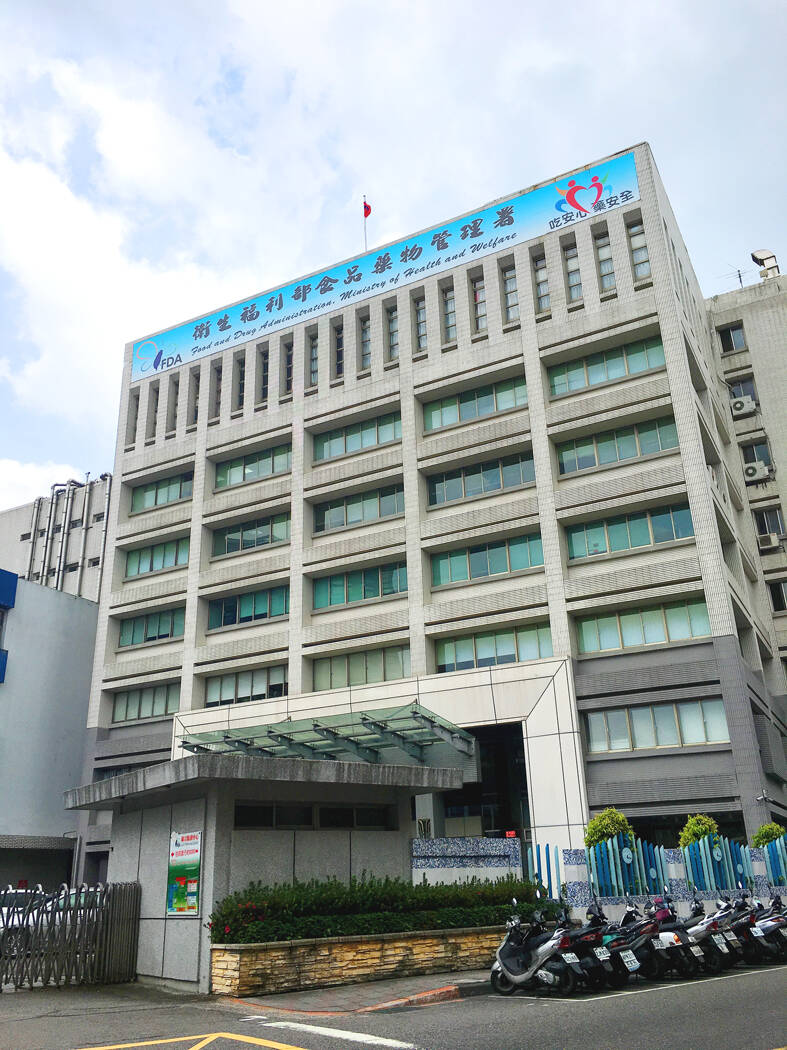Some products bought in pharmacies, including tampons and adhesive bandages, are listed as “medical devices” in Taiwan and may not be resold, the Food and Drug Administration (FDA) said yesterday.
Many people did some spring cleaning before the Lunar New Year holiday and might have found unused items, or they might have purchased too many products from pharmacies while traveling abroad during the holiday, but people should determine if the items are considered medical devices before selling them, the FDA said.
Medical masks, adhesive bandages, gauzes, medical cotton swabs, condoms, tampons, menstrual cups, contact lenses, contact lens cases, contact lens solutions, nasal aspirators and liquid medication dispensers are medical devices commonly mistaken as general goods, it said.

Photo: Chung Li-hua, Taipei Times
People who do not have a medical device business permit issued by the FDA are not permitted to sell medical device products, whether through online platforms, in physical stores or by delivering the items by hand, the FDA said.
People who do so might be fined between NT$30,000 and NT$1 million (US$959 and US$31,966) in accordance with the Medical Devices Act (醫療器材管理法).
The FDA last year said vaginal infections can be more common in the winter, because some women like to wear tight, heavy and less breathable clothing, which could lead to the development of symptoms such as irritation, discharge and itching of the vagina and the vulva.
Some of those women might turn to intimate cleansing and care products, such as a “therapeutic vaginal douche apparatus” — a device that delivers a stream of liquid (douche solution) into the vaginal cavity for medical or hygienic purposes — but that is also a medical device, so the production and sales of the product require a permit, the agency said.
The apparatus is mainly used for medical treatment, rather than for daily general hygiene purposes, so people should carefully read the instructions, the FDA added.
People who independently purchase medical devices should follow three safety rules, it said.
These are identifying whether the products are medical devices, checking the medical device license number or listing number that is required on the product label, and carefully reading the instructions on how to use them correctly and safely, the agency said.
People who want to look up a medical device’s permit and its registered information can go to the FDA’s database (https://lmspiq.fda.gov.tw) for confirmation, it added.
If people develop an adverse reaction after using a medical device, they should report it to the Ministry of Health and Welfare’s National Adverse Drug Reaction Reporting System by calling (02) 2396-0100 or the FDA’s website (https://qms.fda.gov.tw), it added.

The Grand Hotel Taipei on Saturday confirmed that its information system had been illegally accessed and expressed its deepest apologies for the concern it has caused its customers, adding that the issue is being investigated by the Ministry of Justice Investigation Bureau. The hotel said that on Tuesday last week, it had discovered an external illegal intrusion into its information system. An initial digital forensic investigation confirmed that parts of the system had been accessed, it said, adding that the possibility that some customer data were stolen and leaked could not be ruled out. The actual scope and content of the affected data

‘LIKE-MINDED PARTNER’: Tako van Popta said it would be inappropriate to delay signing the deal with Taiwan because of China, adding he would promote the issue Canadian senators have stressed Taiwan’s importance for international trade and expressed enthusiasm for ensuring the Taiwan-Canada trade cooperation framework agreement is implemented this year. Representative to Canada Harry Tseng (曾厚仁) in an interview with the Central News Agency (CNA) said he was increasingly uneasy about Ottawa’s delays in signing the agreement, especially as Ottawa has warmed toward Beijing. There are “no negotiations left. Not only [is it] initialed, we have three versions of the text ready: English, French and Mandarin,” Tseng said. “That tells you how close we are to the final signature.” Tseng said that he hoped Canadian Prime Minister Mark Carney

POSITIVE DEVELOPMENT: Japan and the US are expected to hold in-depth discussions on Taiwan-related issues during the meeting next month, Japanese sources said The holding of a Japan-US leaders’ meeting ahead of US President Donald Trump’s visit to China is positive news for Taiwan, former Japan-Taiwan Exchange Association representative Hiroyasu Izumi said yesterday. After the Liberal Democratic Party’s landslide victory in Japan’s House of Representatives election, Japanese Prime Minister Sanae Takaichi is scheduled to visit the US next month, where she is to meet with Trump ahead of the US president’s planned visit to China from March 31 to April 2 for a meeting with Chinese President Xi Jinping (習近平). Japan and the US are expected to hold in-depth discussions on Taiwan-related issues during the

President William Lai (賴清德) yesterday bestowed one of Taiwan’s highest honors on Saint Vincent and the Grenadines (SVG) Ambassador Andrea Clare Bowman in recognition of her contributions to bilateral ties. “By conferring the Order of Brilliant Star with Grand Cordon on Ambassador Bowman today, I want to sincerely thank her, on behalf of the Taiwanese people, for her outstanding contribution to deepening diplomatic ties between Taiwan and SVG,” Lai said at a ceremony held at the Presidential Office in Taipei. He noted that Bowman became SVG’s first ambassador to Taiwan in 2019 and